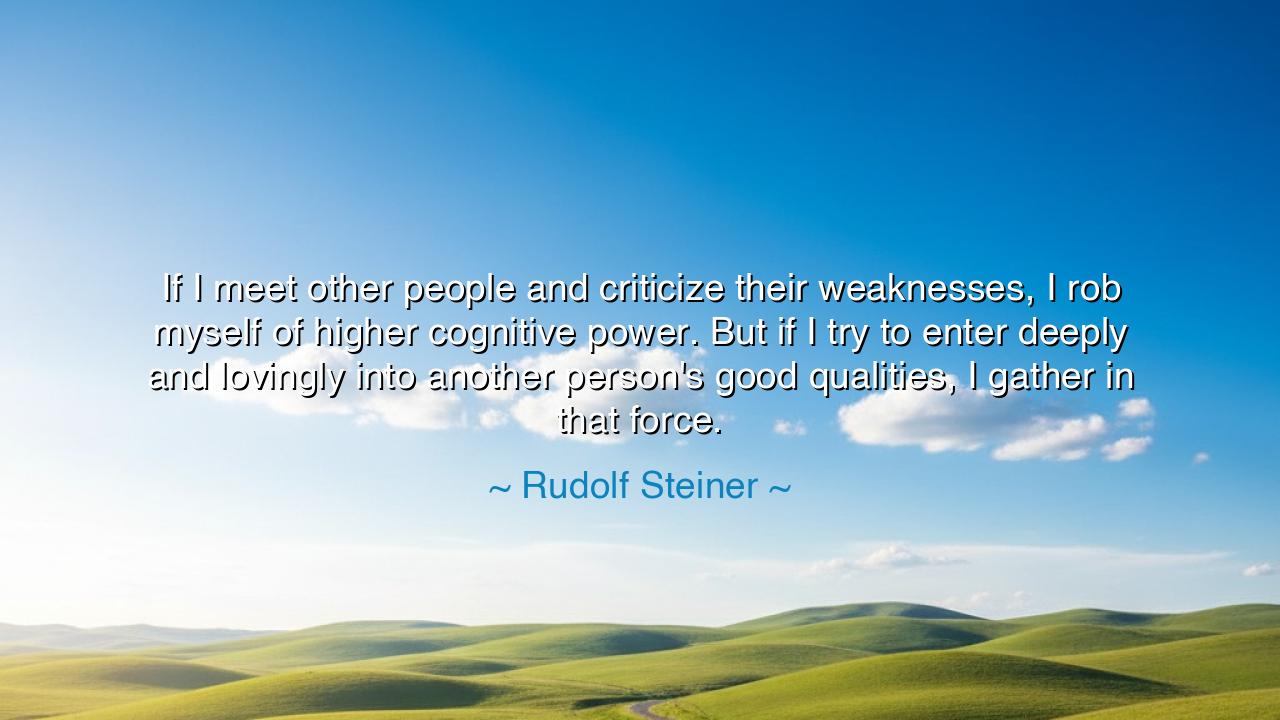
If I meet other people and criticize their weaknesses, I rob
If I meet other people and criticize their weaknesses, I rob myself of higher cognitive power. But if I try to enter deeply and lovingly into another person's good qualities, I gather in that force.






Rudolf Steiner, seer of the spiritual life, declares with profound insight: “If I meet other people and criticize their weaknesses, I rob myself of higher cognitive power. But if I try to enter deeply and lovingly into another person’s good qualities, I gather in that force.” In these words he reveals a law of the soul: that to dwell on the weaknesses of others is to diminish oneself, but to honor their good qualities is to partake in their strength. What we focus upon, we become; what we cherish in others, we draw into our own being.
The ancients too grasped this secret. Marcus Aurelius, in his Meditations, urged himself daily to contemplate the virtues of those around him—one’s courage, another’s humility, another’s patience—so that he might cultivate those virtues within his own soul. He knew that to focus only on fault is to shrink, but to celebrate what is noble in others is to grow. Steiner’s teaching is the echo of this same Stoic wisdom: the soul gathers light when it seeks light in others.
History offers shining examples. Consider Abraham Lincoln, who led a divided nation through civil war. Though surrounded by rivals, he chose not to magnify their failings, but to see and use their strengths. His “team of rivals” cabinet became a source of power, not weakness, because Lincoln sought to gather the force of their good qualities rather than dwell on their flaws. This magnanimity gave him the inner power to preserve the Union.
Steiner also teaches us that criticism, though it may seem sharp, drains the critic more than the one criticized. For in constantly seeking fault, the heart becomes small and the mind clouded. But in approaching others with love, perceiving their hidden nobility, the spirit expands. We not only uplift them, but also awaken our own higher faculties. To live thus is to gather strength as a tree gathers sunlight, transforming admiration into nourishment.
Let the generations remember: to see another’s weaknesses is easy, but to enter lovingly into their goodness is divine. By criticism we rob ourselves; by reverence we enrich ourselves. Seek out the noble spark in every soul, and you will kindle it in yourself. For the one who walks in this path does not merely live among men—he grows with them, partaking in a shared light that raises all closer to the eternal.






DHNgoc Duong Hong
This quote encourages reflection on the relationship between energy, attention, and growth. I wonder whether Steiner implies that criticizing others actively diminishes our potential, or simply diverts it. How might this principle apply in education, workplaces, or personal relationships? It also makes me think about the habit of gratitude and positive observation as tools for cognitive and emotional enrichment, suggesting that the quality of our attention can shape both perception and intellectual capacity.
DTDuy Thuy
I feel inspired by this perspective, yet it raises practical questions. How do we balance acknowledging flaws with emphasizing strengths, especially in situations where critique is necessary? Does focusing on virtues risk ignoring serious problems, or can it provide a constructive lens for improvement? The quote prompts me to reflect on daily interactions—how can cultivating an appreciative and attentive mindset enhance understanding, creativity, and collaborative intelligence?
HHHue Ha
This statement sparks curiosity about the psychology of perception and focus. How much of our mental energy is drained by criticism compared to appreciation? I also question whether entering deeply into another’s strengths requires prior cultivation of mindfulness or emotional stability. Could this approach transform conflict resolution, teaching, and leadership? The quote makes me consider how actively looking for goodness in others can influence not only personal development but also social harmony.
HLNgoc Hau LE
Reading this, I’m intrigued by the idea that focusing on others’ virtues can enhance one’s own cognitive and spiritual capacities. I wonder whether this approach is universally effective or dependent on mindset and emotional intelligence. Does consistently seeking the good in others genuinely develop one’s own abilities, or is it more about fostering empathy and positive relationships? The quote encourages reflection on how attention and attitude shape personal growth and insight.